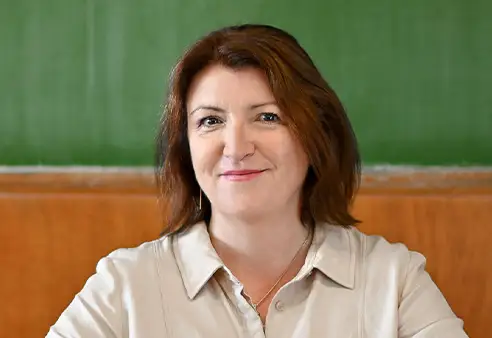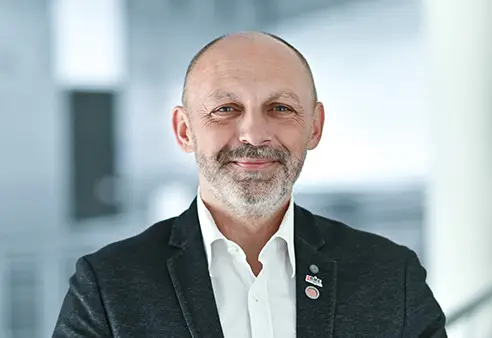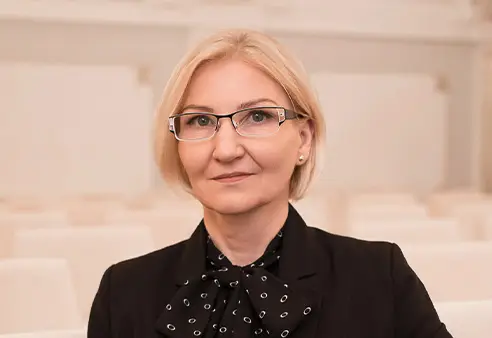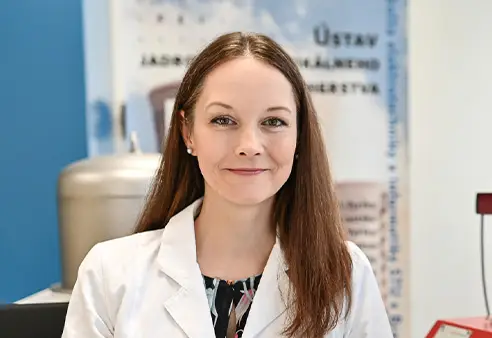Prof. RNDr. Ľubomír Tomáška, DrSc., is a scientist and educator who tries to pass his experience on to new generations of students at the Faculty of Natural Sciences of Comenius University. As part of his scientific activity, he reveals ways of communication between individual components of the cell and examines the molecular mechanisms by which the integrity of the genome is maintained.
Together with Professor Jozef Nosek, he runs the Department of Genetics at the Faculty of Natural Sciences at Comenius University, where his team of scientists and students deal with identifying the mechanisms that ensure communication between individual parts of our cells. Their main goal is to find out how the DNA molecules in chromosomes, namely their end sections (so-called telomeres), protect against damage that would have fatal consequences for the cell. They also study how mitochondria, the energy centres of cells, communicate with other parts of the cell.
Ľubomír Tomáška comes from Žilina. He graduated from the Faculty of Natural Sciences of Comenius University in Bratislava in 1989 with a genetics and molecular biology degree. He was a student of biochemist Professor Ladislav Kováč, who opened the door for him to study attractive scientific problems and meet with inspirational, wise people who created a crucially important environment for his career. He was also able to draw on scientific and pedagogical inspiration immediately after graduation, spending almost three years in the laboratory of biochemist Efraim Racker at prestigious Cornell University from 1990.
Professor Tomáška considers discovering a new way of maintaining telomeres to be among his most outstanding achievements. Together with Jozef Nosek and their common team, he identified so-called telomeric rings, which are copied outside the chromosome and serve as an external source of telomeric sequences. The importance of this discovery is underlined by other laboratories' findings that telomeric rings are involved in maintaining telomeres in some types of tumour cells.
He is inspired by his teachers and colleagues, successful scientists, and tips from professional didactic workers in his teaching activities. "Even by experimenting in pedagogy, a teacher can approach the Comenius ideal of a gardener-teacher who can fully support the development of the potential of his pupils." According to Tomáška, a good teacher should be a competent expert and didactic worker. He should be a personality with moral integrity, contagious optimism and a joy of teaching, conveying empathy and warmth to his students and colleagues. In his opinion, the quality of education depends primarily on the quality of teachers. He claims it is detrimental that our system does not have adequate tools to discriminate in favour of excellent teachers. He believes that, despite several weaknesses in higher education, our universities offer many study programmes, and their graduates can compete with the graduates of foreign universities. For example, the fact that students of the Faculty of Natural Sciences at Comenius University have the opportunity to work on a real and original scientific problem within the framework of their diploma projects for at least two years is not commonplace, even at top universities abroad.
Professor Tomáška considers excellent and provocative questions from students at lectures and seminars, especially when they are the initiators of an interesting polemic or have interesting non-conforming ideas on how to solve a practical problem, to be pleasurable and rewarding. However, the teacher's ultimate success lies in the achievements of the students with whom he has had the opportunity to cooperate.
And what would Professor Tomáška recommend to future students and scientists? “Choose the field you are interested in, identify patterns that will inspire you, address an important and non-trivial problem, and surround yourself with talented people who will respect each other and not be discouraged by frustrations about failures or hostility from the surroundings. These are prerequisites for you to have real intellectual pleasure from science, education, and any activity."



